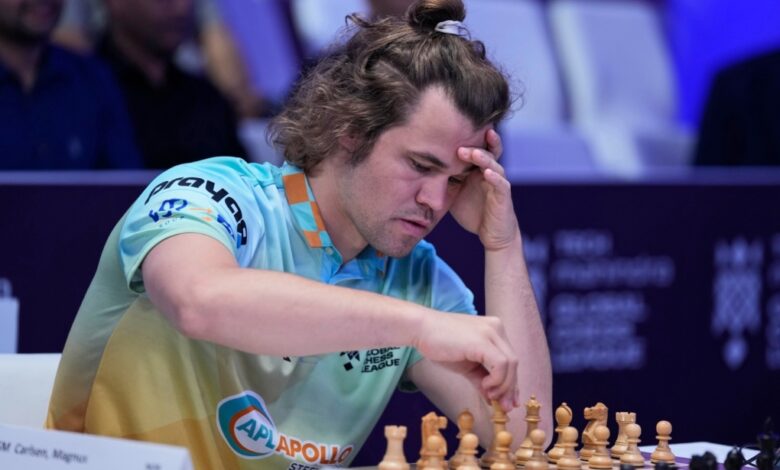Decision to block trans women from chess events draws fire

GENEVA –
A top global chess official Friday called for more research into whether factors such as hormone levels and physical endurance might have an impact on players’ abilities at the male-dominated game. Her comments came after the world chess federation was heavily criticized for its decision to block transgender women from official women’s events.
The Switzerland-based federation FIDE said the decision, set to take place Monday, would stay in effect until the federation does an assessment of the issue.
Critics, including advocacy groups and some European players and federations, have derided what they call an unnecessary and discriminatory policy that appears to foster “trans panic,” with one former British women’s champion calling for the world federation to reverse its decision.
Dana Reizniece-Ozola, the deputy chair of the chess federation’s management board, insisted the goal of the new regulations was “actually to increase the rights of the transgender persons and allow them being registered under their new gender” in its official directory.
Tournaments for women only were created in the 1970s as a way to foster their participation in a sport that has long been dominated by men. Even now only two per cent of all players — and 10 per cent of rated players — are women, she said.
The new regulations, which could subject transgender women to a waiting period of up to two years as the issue is examined, was aimed at giving FIDE a “grace period” to sort out the matter of transgender players and men’s dominance in the sport.
“What is still not clear is if the hormonal levels do influence the competitiveness in chess,” Reizniece-Ozola said by video from Latvia’s capital, Riga. “There is no serious research or scientific analysis that would prove one or the other way. There are speculations, but no more than that.”
Many sports involving intense physical activity — which chess does not — have been grappling with how to formulate policies toward transgender athletes in recent years.
Cathy Renna, communications director for the U.S. National LGBTQ Task Force, said the new rules appeared to be “a case of trans panic with no justification, not grounded in reality and once again marginalizing trans people.”
Reizniece-Ozola, a former Latvian finance minister, said FIDE, like other sports organizations, needs to balance equality — providing rights to every person to compete on an equal basis — with fair competition. “This is the aspect that really needs more and more research, scientifically based research,” she said.
Culture, she said, was “probably” the main reason that women have been less active in chess “because chess has not been regarded as a sport that is appropriate for women in so many cultures. So that … has created this huge gender gap.”
The foundation of chess, which she called an “intellectual sport,” is equal: “I mean, there is no difference between men and women at the intellectual part. But still, we see that the statistical data show the differences between men and women.”
The federation has open competitions that allow all players to take part, as well as specialized categories, such as for young players and even computers.
Malcolm Pein, director of international chess at the English Chess Federation, said research has been going on for over a half-century into “what makes chess players better,” and he believes “the biological differences don’t account for very much.”
“There may be, you know, tiny differences to do with stamina maybe, and maybe there’s some suggestion of a difference in competitiveness at an early age,” Pein said in a phone interview. “But genuinely, we think that the disparity in playing strength and level between male and female players is due to the participation levels — which are improving since ‘The Queen’s Gambit’,” a TV series which follows the life of a female chess prodigy during her quest to become an elite player.
Pein said those possible differences “don’t justify a discriminatory policy,” and he noted that a transgender woman has been selected to play chess for England, and a transgender woman participated in the British championships last month.
“In the English chess experience, this is solving a problem that doesn’t exist,” he said. “Transgender people have been competing very quietly, very happily for a long time with no issues. And we regard the latest developments as unwelcome.”
Other chess federations and some women players across Europe also voiced their opposition to the new regulations.
Germany’s chess federation messaged on the platform X, formerly known as Twitter, that it was “incomprehensible” that FIDE “still wants to check” the gender status of people legally recognized as women in their own countries.
International chess master Jovanka Houska, a nine-time British women’s champion, wrote on X: “Please, FIDE can you reconsider these anti-trans regulations. There is no shame in backtracking and consulting afresh with trans women and women so that the chess world moves forward with fairness.”
“Together, we can create a progressive, fair and welcoming space for everyone,” she added.




